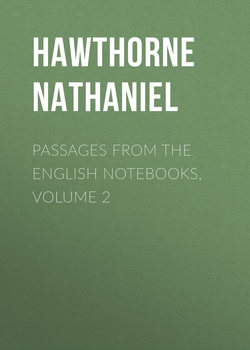Читать книгу Passages from the English Notebooks, Volume 2 - Hawthorne Nathaniel - Страница 9
LONDON. – MILTON-CLUB DINNER
MELROSE
ОглавлениеMelrose is a village of rather antique aspect, situated on the slope and at the bottom of the Eildon Hills, which, from this point of view, appear like one hill, with a double summit. The village, as I said, has an old look, though many of the houses have at least been refronted at some recent date; but others are as ancient, I suppose, as the days when the Abbey was in its splendor, – a rustic and peasant-like antiquity, however, low-roofed, and straw-thatched. There is an aged cross of stone in the centre of the town.
Our first object, of course, was to see the Abbey, which stands just on the outskirts of the village, and is attainable only by applying at a neighboring house, the inhabitant of which probably supports himself, and most comfortably, too, as a showman of the ruin. He unlocked the wooden gate, and admitted us into what is left of the Abbey, comprising only the ruins of the church, although the refectory, the dormitories, and the other parts of the establishment, formerly covered the space now occupied by a dozen village houses. Melrose Abbey is a very satisfactory ruin, all carpeted along its nave and transepts with green grass; and there are some well-grown trees within the walls. We saw the window, now empty, through which the tints of the painted glass fell on the tombstone of Michael Scott, and the tombstone itself, broken in three pieces, but with a cross engraven along its whole length. It must have been the monument of an old monk or abbot, rather than a wizard. There, too, is still the "marble stone" on which the monk and warrior sat them down, and which is supposed to mark the resting-place of Alexander of Scotland. There are remains, both without and within the Abbey, of most curious and wonderfully minute old sculpture, – foliage, in places where it is almost impossible to see them, and where the sculptor could not have supposed that they would be seen, but which yet are finished faithfully, to the very veins of each leaf, in stone; and there is a continual variety of this accurate toil. On the exterior of the edifice there is equal minuteness of finish, and a great many niches for statues; all of which, I believe, are now gone, although there are carved faces at some points and angles. The graveyard around the Abbey is still the only one which the village has, and is crowded with gravestones, among which I read the inscription of one erected by Sir Walter Scott to the memory of Thomas Pardy, one of his servants. Some sable birds – either rooks or jackdaws – were flitting about the ruins, inside and out.
Mr. Bowman and I talked about revisiting Melrose by moonlight; but, luckily, there was to be no moon that evening. I do not myself think that daylight and sunshine make a ruin less effective than twilight or moonshine. In reference to Scott's description, I think he deplorably diminishes the impressiveness of the scene by saying that the alternate buttresses, seen by moonlight, look as if made of ebon and ivory. It suggests a small and very pretty piece of cabinet-work; not these gray, rough walls, which Time has gnawed upon for a thousand years, without eating them away.
Leaving the Abbey, we took a path or a road which led us to the river Tweed, perhaps a quarter of a mile off; and we crossed it by a foot-bridge, – a pretty wide stream, a dimpling breadth of transparent water flowing between low banks, with a margin of pebbles. We then returned to our inn, and had tea, and passed a quiet evening by the fireside. This is a good, unpretentious inn; and its visitors' book indicates that it affords general satisfaction to those who come here.
In the morning we breakfasted on broiled salmon, taken, no doubt, in the neighboring Tweed. There was a very coarse-looking man at table with us, who informed us that he owned the best horse anywhere round the Eildon Hills, and could make the best cast for a salmon, and catch a bigger fish than anybody, – with other self-laudation of the same kind. The waiter afterwards told us that he was the son of an Admiral in the neighborhood; and soon, his horse being brought to the door, we saw him mount and ride away. He sat on horseback with ease and grace, though I rather suspect, early as it was, that he was already in his cups. The Scotch seem to me to get drunk at very unseasonable hours. I have seen more drunken people here than during all my residence in England, and, generally, early in the day. Their liquor, so far as I have observed, makes them good-natured and sociable, imparting a perhaps needed geniality to their cold natures.
After breakfast we took a drosky, or whatever these fore-and-aft-seated vehicles are called, and set out for
